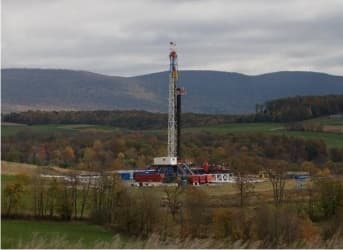The Arab oil embargo, imposed on the United States 40 years ago this fall, brought the instant chaos of gas lines, dire predictions and a new concentration of political minds on the Middle East. The Organization of Petroleum Exporting Countries (OPEC) became a household word -- and a pejorative one at that. The economy shuddered.
Although directed against the West for supporting Israel, the embargo unleashed general global frustration with the way U.S. and European oil companies had negotiated contracts and with the modest returns the oil-producing countries were getting for their asset.
With the largest proven reserves, Saudi Arabia became, in some ways, the most important country on Earth. A small, desert monarchy – more like medieval than modern monarchies -- was both courted and reviled.
Even when the embargo was lifted in March 1974, the crisis continued throughout the decade – and new chaos gripped the world with the Iranian Revolution of 1979. Inflation ravaged the world; in 1974, 24 heads of state lost their jobs due to the inflation.
Oilprice.com Premium: Get the same inside information as the CEOs of Exxon, Chevron and BP - as fast as they get it, often before they get it
In 1975, Congress converted the Atomic Energy Commission into the Energy Research and Development Administration; later, President Jimmy Carter upped the government role with the creation of the Department of Energy. Congress also, in 1978, passed a rather crazy piece of legislation, long repealed, called the Powerplant and Industrial Fuel Use Act, which posited that natural gas was in such short supply and so precious that it could not be used for much of anything except fertilizer and industrial processes – no electricity generation, ornamental flames or pilot lights.
Heroics in Congress did little to fix the situation. But plodding, technological innovation, much of it in government research programs, did. Drilling improved and took a giant step forward with the perfection of horizontal drilling. Also the old oilfield practice of geological fracturing (fracking) improved substantially, opening a bonanza of new oil and gas and changing the face of oil and gas production by putting shale deposits into big-time play.
The world energy picture is turned upside down now. The impossible in 1973 – energy self-sufficiency for the United States -- is in sight.
But all could be lost.
There is mounting evidence that fracking can cause seismic temblors thousands of miles from the site. The fracking is not the culprit but rather the disposal of the brine used to do it.
Oilprice.com Premium: Find out first about the latest technology and technology investments being made by energy industry insiders
The key ingredient in fracking besides water is sand, which wedges itself between the shale rocks and allows the gas or oil to come out. But sand -- or silicate as the drillers like to call it – doesn't suspend in water, so chemicals are added. This makes the water useless for other functions and it is disposed of in “injection wells” where tens of thousands of gallons of waste water, chemicals and other impurities that have been picked up are forced into the ground and abandoned. There are thousands and thousands of these waste-water dump wells across the United States.
Now comes a study, conducted by England's Durham University and published in the journal Science, which confirms that seismic activity, and possibly major earthquakes, can be triggered by injection wells, banned in the United Kingdom and elsewhere in Europe. Sadly, many drillers have reacted with denial. The industry should throw a lot of science at the problem quickly, before a major event is blamed on fracking and the brave new world of abundance is shut down.
The nuclear industry, always sure of its safety, responded to the Three Mile Island accident in 1979 by vastly improving that safety regime and establishing new national and international institutions devoted solely to best practices and enhanced safety. After the Japanese experience at Fukushima Daiichi, the nuclear world again tightened its standards and expectations.
But it has never totally regained public confidence, and that is important.
ADVERTISEMENT
If fracking could, as the Durham study suggests, lead to a major earthquake, that event would be as catastrophic for shale oil and gas recovery as Three Mile Island was for nuclear power. And if the public comes to believe that earthquakes are triggered by fracking, then the hope of energy independence will be doomed and the 1970s could be replayed.
By. Llewellyn King
Llewellyn King is executive producer and host of “White House Chronicle” on PBS. His e-mail is lking@kingpublishing.com.



















These two sentences highlight a serious flaw in how "fracking" is being described by all too many reporters and pundits. Read both of these sentences, and you'll notice that they contradict each other. And yet, there's an insistence on blaming "fracking" for as much as possible -- even if it's not actually fracking, but rather something else. We're not engaging in a fact-based dialogue if we are simply looking for as many ways to implicate fracking as possible.
No doubt, the author will claim that since fracking produces wastewater, then the disposal of that wastewater should be discussed in the context of fracking. In the context? Yes. Conflating a very specific process in shale development (fracking) with a disposal technique that's been around for decades? No.
Need more proof? The major study that was recently released looked at three wastewater disposal sites that weren't even receiving wastewater from fracking operations! Is that mentioned? Is that carefully fleshed out? Of course not. "Fracking" is a hot topic, and great for search engine optimization. The fact that including it obscures the facts is apparently less important -- and that's really unfortunate.
It's a joke I keep reading everywhere, but it cracks me up every time. More, please.
In case you wanted facts instead of buzzwords, read (amongst others) http://oilprice.com/Energy/Natural-Gas/Can-the-US-Export-its-Way-to-Energy-Independence.html